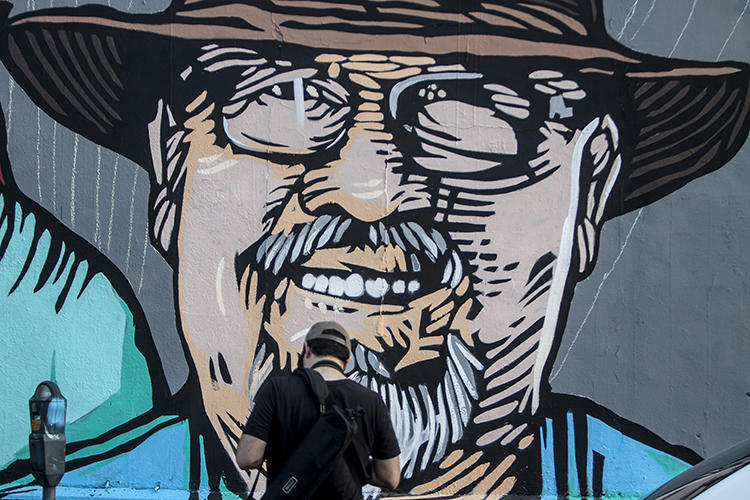For approximately two months, Mexico’s office of the Special Prosecutor for Attention for Crimes Against Freedom of Expression (FEADLE) led a nomadic existence after its building was damaged in a September 19 earthquake that killed almost 400 people in and around Mexico City. The agency now has a new home, but the natural disaster served only to further delay its work investigating attacks on the press.
“It’s good to have a place of our own again,” Ricardo Sánchez Pérez del Pozo, who has led FEADLE since May, told CPJ last month. “Moving around seriously hampered our capacity to work.”
Sánchez’s relief is understandable, but few journalists in Mexico will sympathize. The special prosecutor’s office, like most law enforcement agencies in the country, receives a constant stream of criticism from both press freedom groups and journalists, and for good reason. With a reputation for being understaffed and underfunded, FEADLE so far appears powerless to stop or even properly prosecute attacks against journalists.
Since Sánchez took over last year he says he has taken steps to try to address the critics, including making changes to the way FEADLE investigates cases, hiring more personnel, and working with members of civil society, including CPJ, on ways to improve its methods.
Improvements are needed urgently. Mexico is the deadliest country for journalists in the Western Hemisphere. At least 22 journalists were murdered there in direct relation to their work since 2010, when FEADLE was founded, with six of those killings taking place last year, according to research by CPJ. In another 31 cases, CPJ is investigating to determine if there was a relationship between the victim’s work and their murder. The situation is exacerbated by near complete impunity, with Mexico ranking sixth on CPJ’s annual index of countries where journalists are slain and their killers go free.
“The FEADLE is a disaster, it’s a simulation,” said Emilio Álvarez Icaza, a former executive secretary of the Inter-American Commission of Human Rights. “They’re not achieving any results at all. No arrests, no convictions, nothing.”
Constitutional and judicial reforms in 2012 and 2013 allowed FEADLE to take over investigations from local authorities under certain conditions, such as if local officials are suspected of involvement. But the agency has used this so-called “faculty of attraction” only four times in 2016, the most recent year the agency is able to provide figures for. Sánchez told CPJ the figure for 2017 will be low too, and that the agency has not currently attracted any of the cases of journalists murdered last year.
As well as failing to attract more cases, the agency has had limited success in securing prosecutions. FEADLE statistics show that of the 790 investigations opened since 2010, only 118 reached court. And not a single FEADLE-led murder investigation has resulted in a conviction.
The only conviction in the murder of a journalist last year, according to CPJ research, was that of Oaxacan reporter Marco Hernández Bautista, but the investigation was led by the state attorney general’s office, not FEADLE.
“We know that we have a lot of work to do, there’s no point in denying that there are problems,” Sánchez told CPJ. “We are, however, working hard to improve our performance.”
Part of FEADLE’s low success rate is explained by staffing constraints. Sánchez has to hire new staff from an existing pool of investigators at the Federal Attorney General’s office. The agency has also been led by three special prosecutors since President Enrique Peña Nieto assumed office in 2012.
Press freedom groups, journalists, and officials with knowledge of FEADLE’s inner workings have, on numerous occasions, warned that the agency is continuously understaffed, and criticized its investigators.
“The FEADLE’s performance, up to this day, has been completely insufficient,” said Sara Mendiola, director of Propuesta Cívica, a Mexico City-based organization that provides journalists with pro bono legal assistance. “Part of the problem is that its prosecutors are poorly trained to undertake quality investigations.”
Sánchez said that to improve the agency’s performance, FEADLE is providing better training, developing new investigative methods, and broadening its scope. In addition, Sánchez’s office set up a Context Analysis Unit, which employs six investigators, to look at the circumstances under which journalists are threatened or attacked, to give authorities insight into potential motives.
The number of prosecutors and investigative police has also increased to 22 and 15 respectively. Under Laura Borbolla Moreno, who headed the agency between 2012 and 2015, told CPJ the agency had 15 prosecutors and 14 police. Neither she nor Sánchez were able to confirm the numbers under the previous head, Ricard Nájera.
Sánchez said that the team is currently focused on solving a substantial backlog in cases being prosecuted under Mexico’s previous judicial system. A new system, which set higher investigative standards and allowed for open court hearings, was implemented last year.
But many local journalists with whom CPJ spoke said they will remain skeptical of FEADLE’s ability to protect journalists until it secures more prosecutions and attracts more cases.
“The distance between reality and what the FEADLE actually does is enormous,” said Icaza. “We need to keep demanding, keep insisting that the FEADLE improves, that it increases its performance.”
[Reporting from Mexico City]
